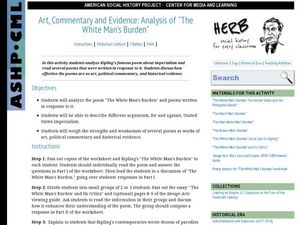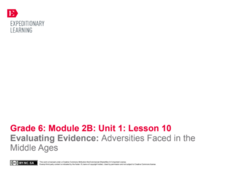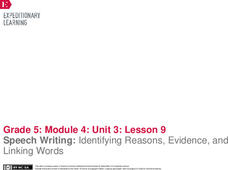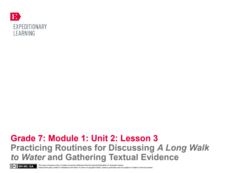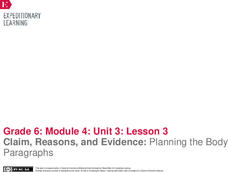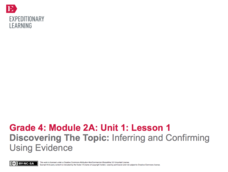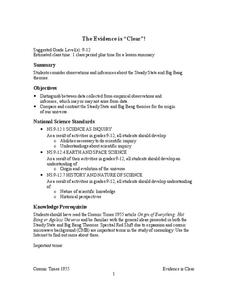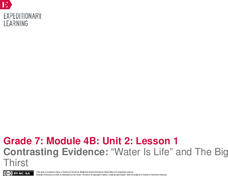Bright Hub Education
Using Evidence and Supporting Details in Writing
In expository writing, it is important to back up claims with evidence and details. Help your class to develop their writing with notes on different types of evidence. Once they have the basics down, practice with a sample thesis and...
Scholastic
Citing Text Evidence
Could you go without your cell phone for 48 hours? Pose this question to your class and then read the article provided here. Pupils mark the text and and complete a graphic organizer that requires the use of textual evidence.
Curated OER
Art, Commentary and Evidence: Analysis of "The White Man's Burden"
A cross-curricular lesson combines poetry and history for your middle and high schoolers. The class critically examines Kipling's poem, "White Man's Burden" as historical evidence of the Imperialist ideology popular during his time. The...
EngageNY
Evaluating Evidence: Adversities Faced in the Middle Ages
How is that relevant? Scholars gain an understanding of the words relevant and compelling. They then go back to the End of Unit 1 Assessment Prompt: Adversity in the Middle Ages and look at the second bullet that pertains to relevant and...
EngageNY
Speech Writing: Identifying Reasons, Evidence, and Linking Words
Enjoy the view. Scholars continue viewing a video of an opinion speech, this time identifying the supporting evidence the speaker employs. After watching, they work in small groups on their shared writing projects, crafting a body...
College Board
Reading—Central Idea and Evidence
Young readers become experts at finding the central idea in informational text with an educational resource. The resource includes helpful tips to annotating close passages to succeed on the actual SAT exam, as well as strategies to make...
Curated OER
Identifying Supporting Evidence from a Text - What is a Hero?
Pupils define hero and identify supporting evidence in a text. They complete a hero diagram worksheet and watch a video about a little boy from China who acts as a hero. Additionally, they complete the Ping Hero evidence worksheet and...
Curated OER
Evidence Revealing the Composition of the Atom
Investigators use indirect evidence to guess what is occupying a sealed box. You could also use a set of plastic Easter eggs to encase the unknown items. Another terrific activity involves having high schoolers drop a pencil on a sheet...
EngageNY
Contrasting Evidence: “Games Can Make a Better World” and “Video Games Benefit Children, Study Finds”
Anecdotes, analogies, testimonies, statistics. The most powerful arguments rely on multiple types of evidence. Scholars explore the topic as they read contrasting evidence about the benefits of video games. They complete Venn diagrams to...
EngageNY
Gathering Textual Evidence: “Invisibility” of Those Interned
Add another layer to the class's understanding. Scholars deepen their knowledge of the primary sources in their Japanese-American Internment during World War II packet and determine how the sources relate to the theme of invisibility....
EngageNY
Writing with Evidence: Percy and the Hero’s Journey (Chapter 7)
Read, set, write! Scholars participate in the first fully independent writing task of the unit as they write about how Percy’s experience in The Lightning Thief aligns with The Hero’s Journey. To begin their writing, they complete a...
EngageNY
Finding Evidence of Carl Hiaasen’s Perspective in Flush
Mix and mingle. Scholars travel around the room to music stopping to meet with a classmate when the music stops. They answer questions about Flush at each stop. Learners then work together to identify the evidence they used to determine...
EngageNY
Practicing Routines for Discussing A Long Walk to Water and Gathering Textual Evidence
Welcome a new teacher (or two)! While most of the class works on the survival anchor chart, one pair begins the Salva/Nya chart and uses it to teach the class. Each day, scholars switch roles, giving every pair a chance to teach their...
EngageNY
End of Unit 3 Assessment: Using Strong Evidence
Young poets view a model two-voice poem while discussing capitalization and punctuation. Pupils also complete an end-of-unit assessment about using strong evidence to support a literary analysis.
EngageNY
Identifying Supporting Reasons and Evidence for an Opinion: Exploring Jackie Robinson’s Promise (Promises to Keep, Pages 38–45)
Readers take a look at pages 40-45 in Promises to Keep and identify evidence to support Sharon Robinson's opinion about her father. They divide up the text and complete task cards before writing vocabulary from the story on index cards.
K20 Learn
Building Arguments With Evidence Part 2: Constructing Arguments
New ReviewWhat is the biggest issue facing young people today? Class members consider the question—along with other provocative pieces from the New York Times—and then try to write their own arguments and back them up with evidence. Once complete,...
EngageNY
Claim, Reasons, and Evidence: Planning the Body Paragraphs
Planning is the key to success. Scholars continue planning their essays by adding reasons to their Planning My Argument graphic organizers. Additionally, pupils analyze a body paragraph from a model position paper, identifying the...
EngageNY
Discovering the Topic: Inferring and Confirming Using Evidence
Allow your class to figure out what they will be studying through an inquiry-based anticipatory set that involves analysis of mystery documents and practice with making inferences. The lesson plan document includes a detailed description...
NASA
The Evidence is “Clear”!
Do you think you know better? Become a scientist and prove it. Scholars review the evidence for two different theories of the origins of the universe. They notice the empirical observations as well as the inferences to determine which is...
EngageNY
Informational Essay Planning: Studying the Essay Prompt and Gathering Evidence
Using a Gathering Evidence note-catcher, readers record evidence in A Mighty Long Way and Little Rock Girl 1957. They then use the evidence to analyze and discuss different mediums with their peers. Lastly, they look at a writing prompt...
K20 LEARN
Arguing With Evidence: Deconstructing Arguments Part 1
In the first lesson in a two-part series, high schoolers pick a social issue important to them and examine an article about the topic, the arguments and evidence used to support the writer's stance, and craft two counter-arguments to the...
EngageNY
Contrasting Evidence: “Water Is Life” and The Big Thirst
Sometimes differing arguments support the same claim. Scholars complete a graphic organizer comparing how two authors support the claim that people need to better manage the world's water supply. Pupils also complete a graphic organizer...
NASA
The Big Climate Change Experiment Lesson 3: Climate Change Lines of Evidence
Consider the preponderance of evidence when making a verdict. The third of five lessons in Unit 1: The Big Climate Change Experiment focuses on the evidence for climate change. Learners study graphs, diagrams, and pictures regarding...
Literacy Design Collaborative
Using Textual Evidence to Analyze Literary Responses to Historical Events
Scholars analyze Animal Farm to learn how to add textual evidence into essays to support their ideas. They search for a deeper meaning to the story and how it relates to the text Totalitarianism and Revolutions in Russia. To finish,...
Other popular searches
- Evidence of Evolution
- Evidence for Evolution
- Citing Textual Evidence
- Textual Evidence
- Evidence for Plate Tectonics
- Supporting Evidence
- Continental Drift Evidence
- Archaeological Evidence
- Dna Evidence for Evolution
- Cite Evidence in Text
- Evidence for Geologic Time
- Indirect Evidence




